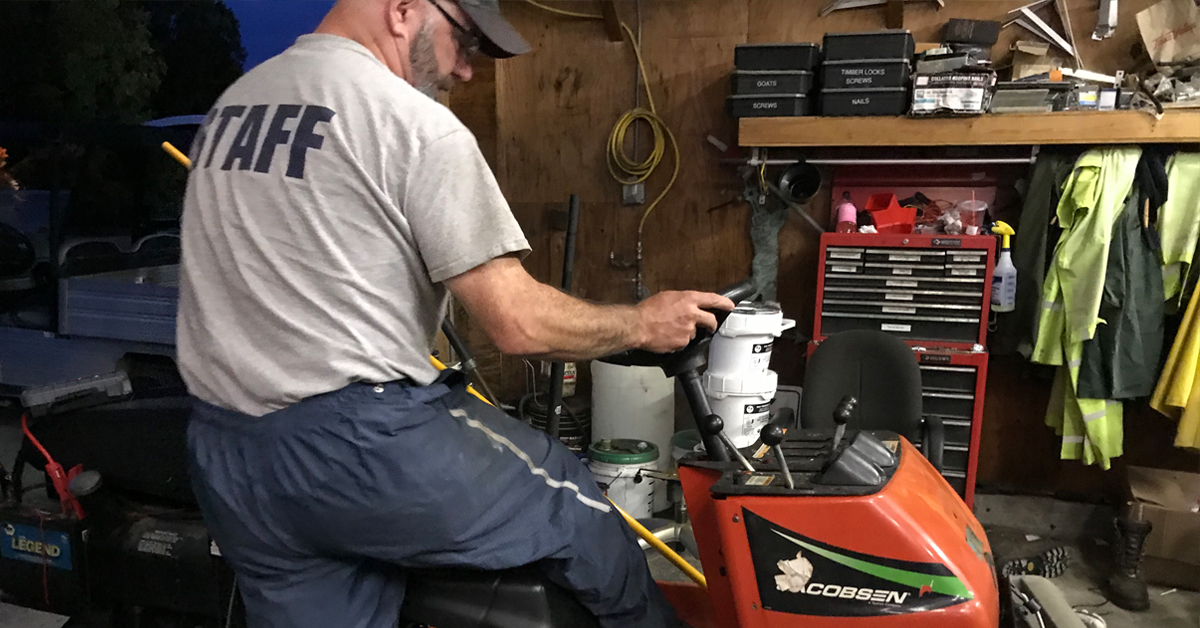Editor’s Note: Wednesday is Thank A Golf Course Superintendents Day, a campaign started by the Golf Course Superintendents of America to recognize those who help keep the game going. As you head out to the golf course during the next few days, please send some kindness to the men and women working hard to preserve and protect golf courses. Just a few kind words can brighten their day and make their work feel appreciated, as it should. This story features an inside look at a morning spent with one of the maintenance crews in the Bay State. While we couldn’t possibly mention every single club and their respective staffs, Mass Golf extends its deepest appreciation to everybody throughout the Bay State who have put in the long hours tending to their courses so golfers can get outside and enjoy the game.
BRAINTREE, Massachusetts – At 6 a.m. just before dawn, the garage doors come flying open to reveal the bright orange machinery. The first four members of the maintenance crew are always the first to arrive at Braintree Municipal Golf Course. Inside the garage, they sip some coffee, pull on their long pants, adjust their mowing machines, and look up at the screen in the corner which has their assigned tasks for the day.
“Gotta stretch,” one crew member says, pulling back his right leg before hopping on one of several mowers.
With the first tee times just 45 minutes away, the first mowers roll out with their single headlight at 6:05 to begin their tasks of cutting tee boxes, greens, and roughs. Braintree gets help from various college-aged kids in the area, and in addition to mowing and spraying, will be assigned to the tasks of filling divots, changing cups, raking bunkers, picking up range balls, and doing whatever it takes to prepare for another full day of golf.
It’s only a Tuesday, but since golf re-opened in May during the COVID-19 pandemic, every day is jammed packed and requires swift precision.
“Everybody really has 17 jobs,” says Joe Curley before hopping on the rough mower. “I like to say we’re jacks of all trades; masters of none.”
***
Life may seem more routine for Golf Course Superintendents statewide, but 2020 has been anything but that. Six months ago, the COVID-19 pandemic forced all golf courses to close until May. Though golf course maintenance was allowed to continue as an essential service in March, many part-time workers were laid off in the golf industry, forcing very limited crews to keep the golf courses ready, but not knowing exactly when they’ll be open for play.
“It was just an eerie feeling,” said Daryn Brown, who serves as Golf Course Superintendent & Club Manager at Braintree. “Lines on fairways were perfect, but after a few weeks, it wasn’t the same. You’re maintaining a golf course for nobody.”

On top of that, there were plenty of COVID concerns. “It’s always been the worry that if one of my employees gets sick, how would we deal with that?,” Brown said. “You only have so many guys who are capable to handle the golf course during the summer stress.”
Brown’s crew often worked staggered shifts throughout the weeks to limit exposure, but in the ensuing months since golf got the green light in May, life for superintendents everywhere has also been unprecedented. According to the National Golf Foundation, Rounds of golf were up 20% nationally in July, which is more than 10 million more rounds than a year ago.
Braintree has seen around 4,000 more rounds from July 1 to the present-day compared to last year, and last year was a record-high. Brown estimates that 66% of those rounds feature people riding carts, adding to the general wear and tear from the approximately 250 rounds per day that take place at Braintree.
“The amount of play has been tremendous, but members have left their mark,” said Brown, who added that bunkers often look like a beach volleyball tournament had taken place in them after each day.
Don Hearn, Executive Director of the Golf Course Superintendents Association of New England, said one of the most difficult aspects is maintaining course expectations with overall slight reductions in staff. And now with 10-minute tee time intervals, crews have a tight window to do their work with minimal interruptions to players.
“It’s been a hastening situation mid-season because everybody has to be kept separate,” Hearn said. “People are platooning staff, individual utility vehicles. If they put bets down in Mid-April, it would’ve been doom and gloom, but now it seems like a happy season with rounds and revenues.”
Even with increased daily responsibilities, Brown said the golf course provides a comforting oasis where the troubles of the world seem to escape him.
“As stressful as a year as this has been, I feel fortunate that I’ve been able to work every day,” Brown said. “I’ve had an experienced crew of young men, and they’ve done a great job this year. They’ve really stepped it up and provided a good product that’s kept the tee sheet full.”
***
At 6:21, the crew is alerted that there’s frost on the course. It’s hardly surprising given overnight temperatures were in the 30s. Immediately, Matt Casey gets in his cart and races down to the lowland areas of the second hole and ninth holes. He walks carefully over to the second green and swirls his hand on the surface.
Casey has been at Braintree since 2001 and now works alongside his son, Matt Jr. or “Matty” as it says on the assignment board. The elder Casey has seen it all when it comes to managing situations on the golf course, everything from irrigation issues to broken equipment and wildlife encounters.

On this day, he’s focused on making sure the line of frost that has formed on the greenside rough is able to heat and melt enough before golfers walk over it. The frost isn’t forming in large pockets, but the tips have frost. Casey says if somebody walks or rides over the surface, it would turn black, and it’d be susceptible to disease and weeds.
Therefore, the course enters a frost delay, meaning the groups that were scheduled to tee off will have to wait until it gets a bit warmer.
In the meantime, Casey zips over to the seventh fairway to see some special assistants to the maintenance crew. Behind a thin white fence are groups of goats, who immediately take notice of Casey’s presence. “What is it?”, he says to them as he reaches over to pet one of them.
The goats are there for a reason. “They’re garbage disposals; anything they reach they eat it,” Casey says.
Their job is to eat away at thorns, weeds, and other invasive plants along the edges of the golf course. The goats move around various portions of the course throughout the year freeing up the crew to work on other tasks.

Braintree certainly isn’t alone in this practice as other nearby courses, such as Olde Scotland Links, Needham Golf Club and Charles River Country Club, have either purchased or rented goats for the same purpose. The Braintree goats are here to stay, and in the winter, they’ll move into an enclosure with a heated water tank.
At 6:47, Casey checks the Weather app on his phone, and the temperature is 43 degrees. The crew will need a little bit more time.
***
While many early-season events were canceled, the Mass Golf competitive season finally got underway in mid-June with Championship Qualifying and Member Day events.
Kevin Eldridge, Mass Golf’s Director of Rules & Competitions, said working with the golf course maintenance team at each host site is paramount to every competition. Together, they coordinate green speeds, lengths of rough, cutting schedules and other variables, all while balancing out the club’s own events.
In total, Mass Golf has hosted more than 100 events when factoring in Championships, Tournaments, Qualifiers and Member Days. Other than accounting for added foot/cart traffic, Eldridge said the Superintendents he’s worked with this year haven’t missed a beat.
“We are so lucky here at Mass Golf to have such a great relationship with all of our Member Club Superintendents,” Eldridge said. “These details and variables are ultimately what make the championship the contest what it is.”
And after each round, it’s common to hear competitive golfers all across the board utter the phrase: “The course is in amazing shape.”
***
At 6:59, the crew gets the all-clear to get back to mowing greens, tees, and changing cups. They’ll have about 30 minutes to get out ahead of the first tee times.

In the meantime, a big sign that says ‘Frost Delay’ hangs on the side of the brick clubhouse as golfers begin congregating near the practice green and first tee box. The delay is hardly a concern for the players, who gather in smaller groups catching up and giving elbow bumps instead of handshakes.
Their tee times may be a little delayed, but many golfers echo the sentiment that they’re glad to be playing golf at all during a pandemic.
“For a public golf course, getting all the play we’re getting is great,” said Braintree member Bob Lyons. “As someone who’s played here for a lot of years, it’s probably better than they can expect because of the play, so that’s a tribute to the work.”
A few minutes later, the clock strikes 7:25 and the first tee shot flies into the air. Another day of golf is clear for play. The crew will continue working through the morning and early afternoon before heading home. They’ll be back up the next day to do it all again.